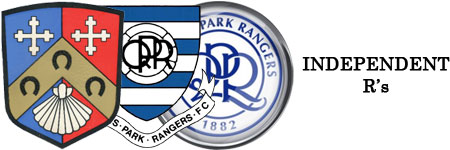Southern League Division One
Team: Clutterbuck, Knowles, McConnell, Tennant, Hitch, Keech, Turnbull, White, Bedingfield, Haywood, Hannah
Attendance: 4,000
QPR had already beaten Thames Ironworks 2-0 at Kensal Rise on Christmas Day 1899. Five days later Rangers travelled to East London for the reverse fixture at the Memorial Grounds in West Ham.
The following match report appeared in ‘The Referee’ the next day:
‘Few clubs in the South have worse luck in the matter of getting players injured than the Thames Ironworks, and the climax came early at the beginning of the present week with the fearfully sudden death of Henry Bradshaw.
The celebrated left-winger was sadly missed today (Saturday) when league points were badly wanted but could not be secured.
When the Thames visited Kensal Rise, they were defeated by 2 goals to nil, and that form was so far reproduced this (Saturday) afternoon as to enable Queen’s Park Rangers to win by 2 goals to 1.
Reverting to poor Bradshaw, we may mention that the funeral will take place in Liverpool on Monday. The Players’ Union have voted his widow the sum of £10, whilst both elevens today wore mourning armlets.
The game was not a great one. Both clubs were pretty well represented, Tennant replacing Crawford at right-half for the Rangers.
The weather was bright and clear, and the ground was in excellent condition. The wind was very high, and in winning the toss, it is doubtful if the Ironworks did such a good thing, for their forwards were quite spun out when they had to face the breeze.
Their forwards could neither run well nor kick accurately, and Queen’s Park undoubtedly owed their success to superior stamina, for they were outplayed in the first-half.
The class of football was not at all great. Not only was the passing scratchy and ill-timed, but the men did not keep their positions at all well, and the forwards were frequently mixed-up with the half-backs.
For the opening half-hour the Ironworks were pressing, but McConnell and Knowles defended well, and the only point the local team could register was one from the foot of McKay, who found the net about 20 minutes after the game had opened.
For the latter period of the opening half, the work was of a fairly even character, but it lacked method.
Crossing over with a lead of one goal, Thames Ironworks, were at once fairly collared. Queen’s Park went right away at once, and their rather noisy supporters in the grand stand raised a perfect yell of triumph when Hannah shot the ball past Moore.
Their satisfaction was short-lived, however, as the outside-right was palpably offside, and his goal was promptly disallowed by referee G. H. Muir.
This had no disconcerting effect upon the team, however. They piled on the pressure thicker than ever, and White only just missed with a fine kick from long range.
A foul against Queen’s Park relieved the Thames, who got down and Carnelly forced a corner, which Allan failed to turn to any account.
The ball was speedily at the other hand, and, after White had failed to do any good with a corner kick, Hannah had revenge for the previous disappointment and equalised the scores.
By this time the Thames Ironworks had become very ragged indeed. There was no combination amongst their forwards, whilst their efforts to obstruct the rival halves were of a scrambling character.
Their second-line worked hard, and the backs were not bad, but it was certain before half the 45 minutes had gone that league points would not fall to the share of their side.
Another fruitless corner to Queen’s Park was succeeded by a fine save on the part of Moore, who dealt with a shot of Hayward’s splendidly. He next had to do ditto with one from White, and whilst he was playing the ball, was handled by Bedingfield.
The subsequent free kick enabled Allan to get down field, where he shot on to the top of the visitors’ net.
Queen’s Park returned, and after Turnbull had missed an opening, two corners were given against Thames. Both were cleared, but from a header by White, Turnbull, Queen’s Park, gave the lead for which they had been so valiantly striving.
This was a quarter-of-an-hour from the close, and for the rest of the time the visitors evinced a disposition to “kick-out” and otherwise play for safety.
Thames Ironworks made one or two efforts to equalise, but never really looked like scoring, and at the close the figures were: Queen’s Park Rangers, 2 goals; Thames Ironworks,1.’
At the end of June 1900, Thames Ironworks resigned from the Southern League and the Club was wound up.
The following month the Club reformed and became West Ham United. They then took the place of Thames Ironworksand joined the Southern League.
Steve Russell
(Thanks to Colin Woodley for unearthing the match report)
